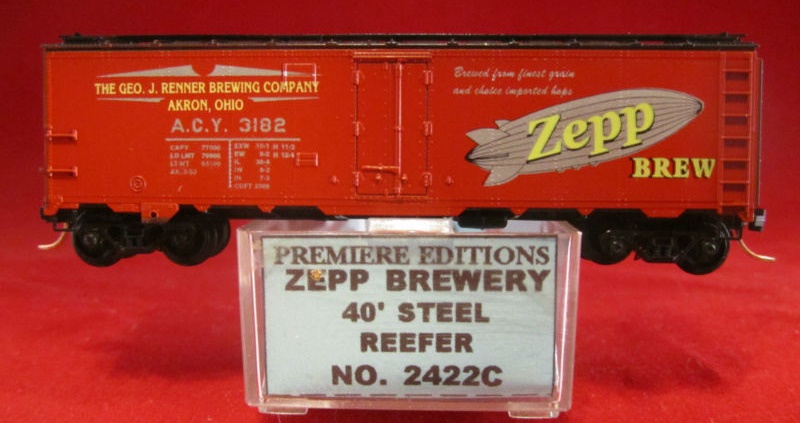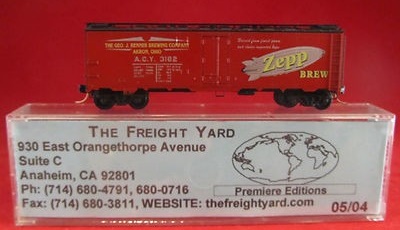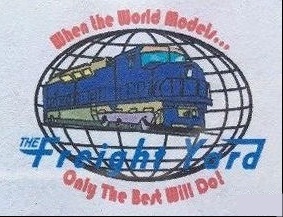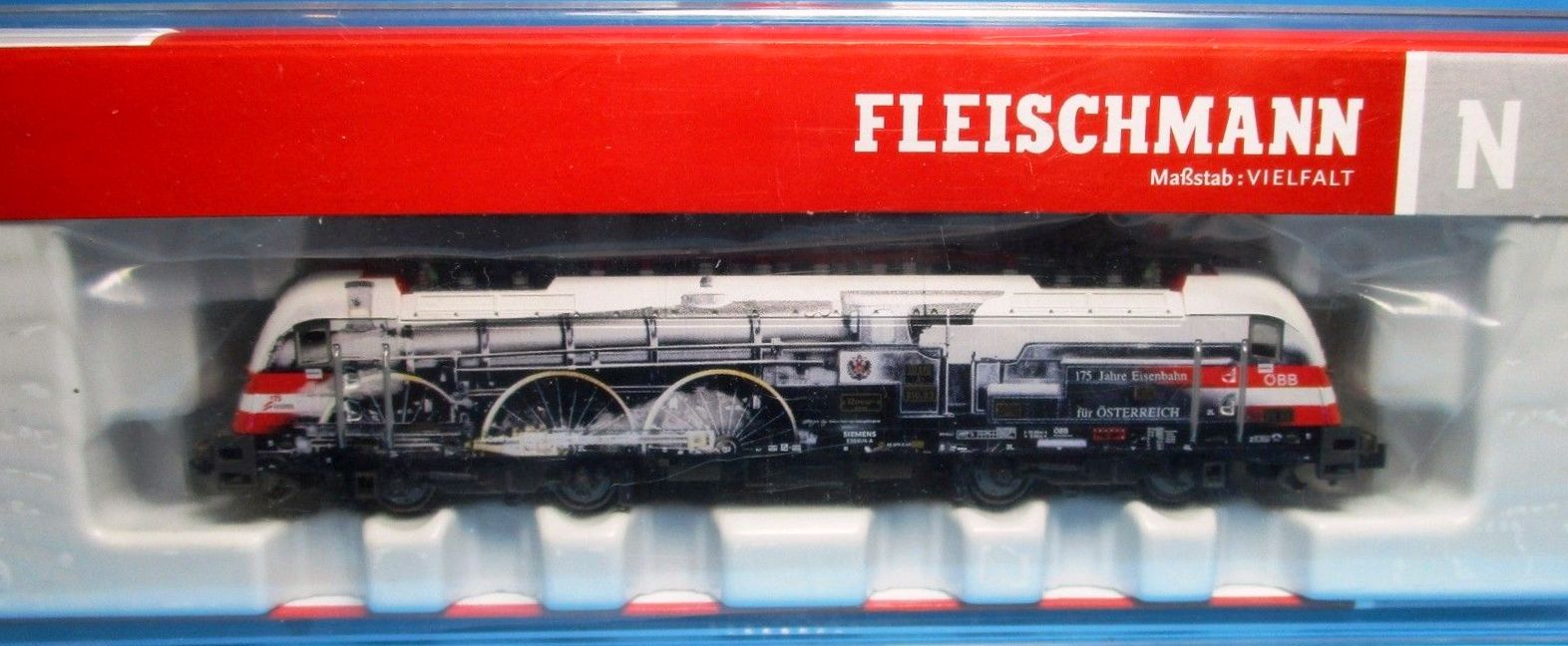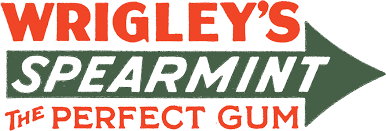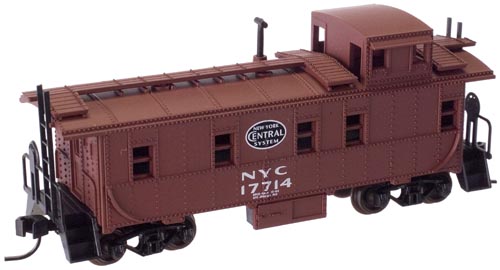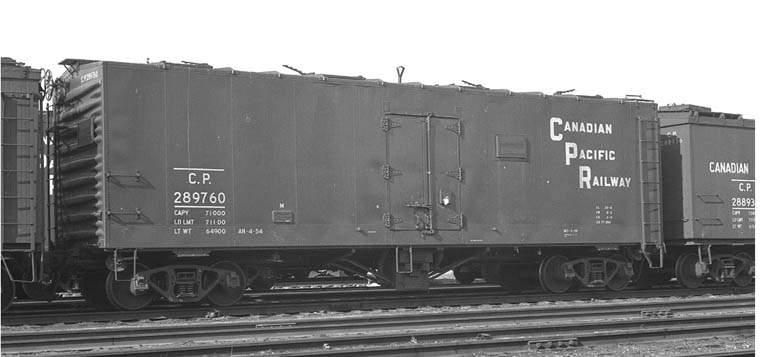Specific Item Information: Micro-Trains Line model decorated by The Freight Yard.
Announced as stock number 2422B, and this stock number announced as road number #3189
Announced as stock number 2422B, and this stock number announced as road number #3189
Model Information: The prototype for this model is the PFE R-40-10 ice reefer built in 1936 and 1937.
MTL released this model with various road names, for which the actual prototype might in fact be different.
MTL released this model with various road names, for which the actual prototype might in fact be different.
Prototype History: Not all steel reefers contained mechanical refrigeration units. Although today we expect that a modern reefer contain an air conditioning unit to be integral to the car design, this was not always true. There was a period following the second world war when the cost of steel was cheap but the cost of a refrigeration unit was high. Early mechanical refrigeration units were unreliable, noisy, expensive and costly to maintain, and for the early post-war years many railroads continued to use ice for refrigeration even though the technology for mechanical refrigeration was possible.
In the post-WWII period, steel once again became readily available and the railroads rapidly replaced their aging fleets of wood reefers with newly constructed steel cars. Among the more common steel reefers for meat and other perishable commodities were those built by URTX. These cars had a horizontal rivet strip along the middle of each side, improved Dreadnaught ends and diagonal-panel roofs.
From Wikipedia and other sources
In the post-WWII period, steel once again became readily available and the railroads rapidly replaced their aging fleets of wood reefers with newly constructed steel cars. Among the more common steel reefers for meat and other perishable commodities were those built by URTX. These cars had a horizontal rivet strip along the middle of each side, improved Dreadnaught ends and diagonal-panel roofs.
From Wikipedia and other sources
Road Name History: The ACY finished their 10 mile line between Mogadore and Akron, Ohio in 1912. In 1920 a big opportunity presented itself as New York Central began selling off a number of subsidiaries to avoid running afoul of anti-trust laws. One of these subsidiaries the Lake Erie & Western had controlled the Northern Ohio Railway which ran from Akron to Delphos, Ohio. The NO was leased to ACY, even though it was 16 times the size of the ACY. They operated under the ACY flag and in 1944 the two merged. They never did reach Canton or Youngstown. The ACY was best known for serving the tire and rubber industry in the Akron area. Passenger service was a bit of an afterthought with the last mixed train operating in 1951.
The heaviest power in the steam fleet were USRA light Mikados, at least one of which was equipped with a tender booster. Their diesel fleet (about 18 locomotives give or take) was a bit odd. Their switchers were all Alco and their road power was all Fairbanks Morse. The FMs were setup to run long hood forward. In 1964, the AC&Y was purchased by the Norfolk & Western as part of the N&W-NKP-Wabash-P&WV-AC&Y consolidation. Unlike the other roads, the N&W kept the AC&Y as a separate operation.
By 1970, all of AC&Y's Alcos and FMs had worn out and had been traded in to EMD. However, they were traded in for new locomotives for AC&Y's parent, Norfolk & Western. N&W then leased older power (mostly ex-Nickel Plate GP-9s) to AC&Y. At that point, the only way to tell you were seeing an AC&Y train was "Leased to AC&Y" painted in small letters below the road number on N&W geeps. Finally, the AC&Y was merged into the Norfolk & Western in 1982 in preparation for the Norfolk Southern merger.
The heaviest power in the steam fleet were USRA light Mikados, at least one of which was equipped with a tender booster. Their diesel fleet (about 18 locomotives give or take) was a bit odd. Their switchers were all Alco and their road power was all Fairbanks Morse. The FMs were setup to run long hood forward. In 1964, the AC&Y was purchased by the Norfolk & Western as part of the N&W-NKP-Wabash-P&WV-AC&Y consolidation. Unlike the other roads, the N&W kept the AC&Y as a separate operation.
By 1970, all of AC&Y's Alcos and FMs had worn out and had been traded in to EMD. However, they were traded in for new locomotives for AC&Y's parent, Norfolk & Western. N&W then leased older power (mostly ex-Nickel Plate GP-9s) to AC&Y. At that point, the only way to tell you were seeing an AC&Y train was "Leased to AC&Y" painted in small letters below the road number on N&W geeps. Finally, the AC&Y was merged into the Norfolk & Western in 1982 in preparation for the Norfolk Southern merger.
Brand/Importer Information: The Freight Yard was a hobby shop that did custom decoration and special runs of other manufacturers' N Scale products. It sold its custom products under several brands or collections: Premiere Editions, by The Freight Yard and Dreams Design.
It was located in Anaheim, California and then moved to 2006 in Phoenix, Arizona.
Established in the late 1980s, it stopped business under this name by the end of the 2000s.
The Freight Yard was owned and operated by Darren J. Cohen. Darren is now operating North Valley Trains.
The Freight Yard / Premiere Editions runs are usually available in series of two to twelve different numbers (suffixed A to M, with I not used).
The first two digits of the stock number correspond to the release year (9x being 199x, and 2x being 200x).
It was located in Anaheim, California and then moved to 2006 in Phoenix, Arizona.
Established in the late 1980s, it stopped business under this name by the end of the 2000s.
The Freight Yard was owned and operated by Darren J. Cohen. Darren is now operating North Valley Trains.
The Freight Yard / Premiere Editions runs are usually available in series of two to twelve different numbers (suffixed A to M, with I not used).
The first two digits of the stock number correspond to the release year (9x being 199x, and 2x being 200x).
Manufacturer Information:  Micro-Trains Line split off from Kadee Quality Products in 1990. Kadee Quality Products originally got involved in N-Scale by producing a scaled-down version of their successful HO Magne-Matic knuckle coupler system. This coupler was superior to the ubiquitous 'Rapido' style coupler due to two primary factors: superior realistic appearance and the ability to automatically uncouple when stopped over a magnet embedded in a section of track. The success of these couplers in N-Scale quickly translated to the production of trucks, wheels and in 1972 a release of ready-to-run box cars.
Micro-Trains Line split off from Kadee Quality Products in 1990. Kadee Quality Products originally got involved in N-Scale by producing a scaled-down version of their successful HO Magne-Matic knuckle coupler system. This coupler was superior to the ubiquitous 'Rapido' style coupler due to two primary factors: superior realistic appearance and the ability to automatically uncouple when stopped over a magnet embedded in a section of track. The success of these couplers in N-Scale quickly translated to the production of trucks, wheels and in 1972 a release of ready-to-run box cars.
Micro-Trains Line Co. split off from Kadee in 1990 to form a completely independent company. For this reason, products from this company can appear with labels from both enterprises. Due to the nature of production idiosyncrasies and various random factors, the rolling stock from Micro-Trains can have all sorts of interesting variations in both their packaging as well as the products themselves. When acquiring an MTL product it is very important to understand these important production variations that can greatly enhance (or decrease) the value of your purchase.
Please consult our Micro-Trains Collector's Guide

Micro-Trains Line Co. split off from Kadee in 1990 to form a completely independent company. For this reason, products from this company can appear with labels from both enterprises. Due to the nature of production idiosyncrasies and various random factors, the rolling stock from Micro-Trains can have all sorts of interesting variations in both their packaging as well as the products themselves. When acquiring an MTL product it is very important to understand these important production variations that can greatly enhance (or decrease) the value of your purchase.
Please consult our Micro-Trains Collector's Guide
Item created by: CNW400 on 2020-06-10 16:38:00. Last edited by Alain LM on 2022-11-28 00:46:23
If you see errors or missing data in this entry, please feel free to log in and edit it. Anyone with a Gmail account can log in instantly.
If you see errors or missing data in this entry, please feel free to log in and edit it. Anyone with a Gmail account can log in instantly.


